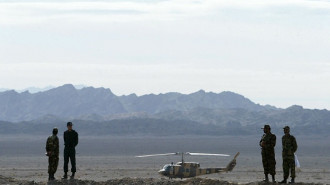Lebanon launches unprecedented investigation into Ghanaian domestic worker's death following outcry
Lebanon launches unprecedented investigation into Ghanaian domestic worker's death following outcry
After a report by Al Jazeera detailed the harrowing circumstances surrounding the death of migrant worker Faustina Tay, Lebanon has opened an unprecedented high-level investigation.
3 min read
Lebanese law offers no protection to migrant domestic workers [This is Lebanon]
Lebanon's justice and interior ministries are carrying out investigations into the death of a migrant domestic worker, after a report by Al Jazeera documented the circumstances surrounding her death.
Faustina Tay, a Ghanaian national, was found dead in a car park in Beirut's southern suburbs on March 14, under the building where her employer lived, Al-Jazeera said.
The initial forensic investigation, according to Al Jazeera, specified the cause of death as a "fall from a high place." The doctor who examined the body said there were "no marks of physical assault".
Al Jazeera said that the police had deemed Tay's death as a suicide.
Prior to her death, Tay had made multiple calls for help in text messages and voice notes sent to her brother in Ghana, according to This is Lebanon –a Canada-based activist group that shares narratives of domestic workers alleging abuse in Lebanon. According to Amnesty International, Lebanon is home to over 250,000 migrant domestic workers – the majority of whom are women who come from African and Asian countries to work as housekeepers in private homes.
Tay was among these women employed under Lebanon's controversial kafala – or sponsorship – system which legally binds the worker's residence in the country to their employer.
Domestic workers can only terminate their contract with the consent of the employer. Otherwise, they become illegal residents and can be jailed or deported.
The initial forensic investigation, according to Al Jazeera, specified the cause of death as a "fall from a high place." The doctor who examined the body said there were "no marks of physical assault".
Al Jazeera said that the police had deemed Tay's death as a suicide.
Prior to her death, Tay had made multiple calls for help in text messages and voice notes sent to her brother in Ghana, according to This is Lebanon –a Canada-based activist group that shares narratives of domestic workers alleging abuse in Lebanon. According to Amnesty International, Lebanon is home to over 250,000 migrant domestic workers – the majority of whom are women who come from African and Asian countries to work as housekeepers in private homes.
Tay was among these women employed under Lebanon's controversial kafala – or sponsorship – system which legally binds the worker's residence in the country to their employer.
Domestic workers can only terminate their contract with the consent of the employer. Otherwise, they become illegal residents and can be jailed or deported.
Under the Kafala system, the termination of a work contract would also eliminate the legal residence status of the worker, forcing them to leave the country or go into hiding.
No exceptions are made, even in cases of abuse. While the worker is allowed to legally change their sponsor, the process cannot be done without the permission of the initial employer.
Brittish model and actress Naomi Campbell used her platform to share Tay's story to a following of over 8.5 million on Instagram. The supermodel also took to twitter to call for an end to such incidents.
The reported incident has sparked outrage internationally.
"I don’t even know what to say beyond, and we know this, the slave trade is alive and well and it disproportionately impacts women of african descent like Faustina. My heart literally aches. #sayhername," wrote NY-based writer and entrepreneur Ayesha K Faines on twitter.
Read more: Lebanon hospitals 'discriminating against' undocumented workers seeking vital coronavirus testing
Following international backlash, Lebanon's Foreign Minister Nassif Hitti expressed his condolences to Tay’s family – in a tweet on March 27 – and said he had directed the Ministries of Justice and Interior to "broaden" investigations and "hear everyone involved in the case."
However, new developments have reported yet by Lebanon's security agencies and ministries since the high-profile investigation was announced.
Last year, Amnesty International released a 67-page report documenting abuse claims by migrant domestic workers in Lebanon. The report details abuses and inhumane working conditions including "extreme working hours, lack of rest days, severe restrictions on freedom of movement and communication, food deprivation and lack of proper accommodation."
More extreme abuses documented by the international watchdog include psychological and verbal abuse, physical violence, forced labour and human trafficking.

![Palestinians mourned the victims of an Israeli strike on Deir al-Balah [Getty]](/sites/default/files/styles/image_684x385/public/2024-11/GettyImages-2182362043.jpg?h=199d8c1f&itok=xSHZFbmc)


![The law could be enforced against teachers without prior notice [Getty]](/sites/default/files/styles/image_684x385/public/2178740715.jpeg?h=a5f2f23a&itok=hnqrCS4x)
 Follow the Middle East's top stories in English at The New Arab on Google News
Follow the Middle East's top stories in English at The New Arab on Google News
![Fakhrizadeh [AFP] Fakhrizadeh [AFP]](/sites/default/files/styles/image_330x185/public/media/images/774C39F7-8F7A-4D67-B998-27D102FCB4A7.png?h=d1cb525d&itok=j9eGvunV)

